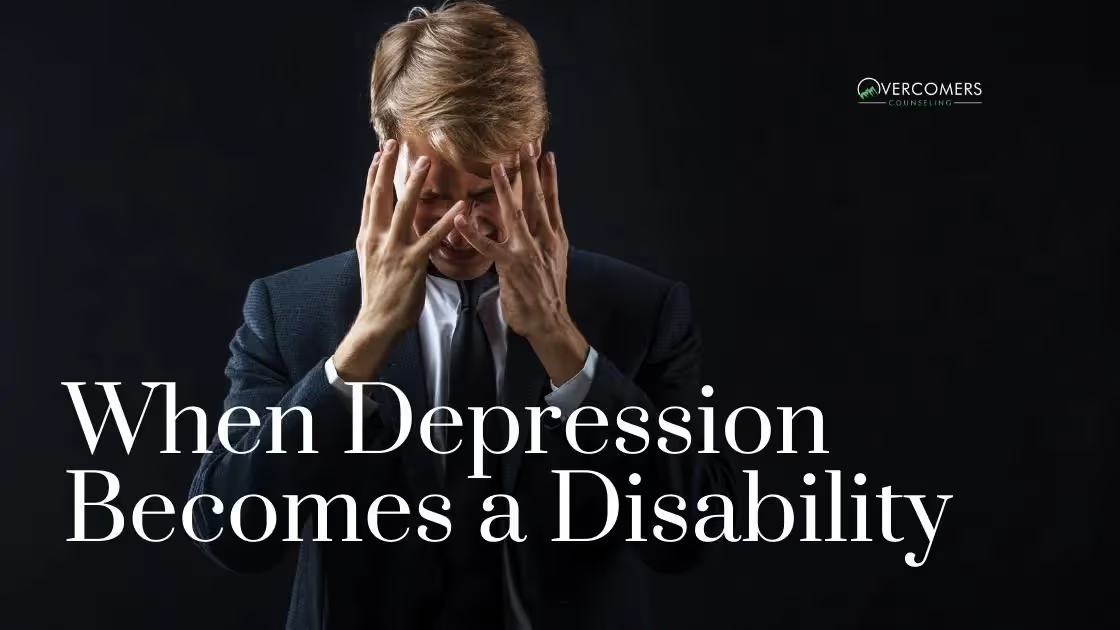It's no secret that depression can disrupt your life, but when depression becomes a disability it can feel like it's almost ruining it.Research shows that...

It's no secret that depression can disrupt your life, but when depression becomes a disability it can feel like it's almost ruining it.
Research shows that depression and anxiety are the most common causes of disability in adults in the United States.
And, these same studies show that most people who suffer from depression also suffer from anxiety and vice versa.
Understanding How Depression Becomes a Disability
Your first step in knowing what to do when depression becomes a disability is understanding how depression becomes a disability.
Depression can make even small tasks seem impossible.
This means tasks and projects at work, household chores, and childcare may begin to suffer if you have depression.
Depression has also been shown to affect your executive skills that reduce your ability to problem solve, make decisions, create long-term plans, and pay attention.
These effects may disrupt your ability to work or to be successful at your job.
Research also shows that depression can affect your memory; making it difficult for you to remember work assignments or tasks that you need to complete around the house.
There are the typical effects of depression that can affect your ability to perform at work, but there are additional symptoms that can make depression become a disability.
These include, but are not limited to: a lack of motivation, irritability (with employers, clients, or co-workers), paranoia, sleep disturbances that may make you late or groggy on the job, as well as physical pain.
People who experience depression often report headaches and back pain that may be as severe as a pinched nerve or dislocation disk.
If your depression is becoming a disability or you're worried that it might become one, the first step you should take is to seek treatment.
You'll want to reduce the effects of depression before they permanently disrupt your career or your ability to work.
For some people, depression can also permanently disrupt their ability to work.
It can prevent you from being capable of working a full-time job.
This is when depression becomes a disability.

If your depression has become a disability, then it's important for you to understand how disability benefits can help.
When depression makes you incapable of working a full-time job, that's when depression becomes a disability.
That's also when you should start considering applying for social security disability benefits.
Social security benefits could cover the financial gap while you're suffering from depression.
Social security disability benefits average between $800 and $1,800 per month.
At the beginning of 2019, Social Security paid an average monthly disability benefit of about $1,200.
This averages about $12,140 every year.
While this could significantly help you if your depression has affected your income, many beneficiaries still live below the poverty line.
Particularly, because most disability beneficiaries have it as their only form of income.
However, it can be difficult to qualify for social security disability benefits.
Particularly, if you're applying due to a mental health issue such as depression.

Because depression does not show up in traditional medical scans like blood tests or x-rays, it can be difficult to prove that you qualify.
This means that in order to file a successful claim, you'll need to show a history of your medical treatment.
This means that if you're not currently being treated for your depression, you should start immediately.
Be sure to give your full history to any health provider that you speak to so that your history with depression can be fully documented for your claim.
Having records from a personal medical doctor, primary caregiver, a psychologist, a therapist, and/or a social worker will help support your claim and reduce your chances of being declined.
Don't get too discouraged if you don't have a long recorded history of depression already.
You won't have to rely solely on official medical records for your application.
Your physician or therapist can also write a letter on your behalf.
Social security has specific criteria that one must meet if applying because depression has become a disability.
You'll be required to provide documentation that you have a depressive disorder with at least five of the following symptoms: depressed mood, loss of interest in almost all activities, sleep disturbances, decreased energy, feelings of guilt or worthlessness, difficulty concentrating or thinking, appetite disruptions accompanied by weight changes, observable irritation or agitation, and thoughts of suicide.
You'll also need to show extreme limitation in one or significant limitation in two of the following: your ability to understand or apply information, interactions with others, decreased ability to concentrate, ability to adapt to changes or to manage oneself.
Finally, you'll also need to demonstrate that your depression is both "serious and persistent."
You'll want to have a medically documented history of your depression over a period of at least two years.
This means you'll need a history of treatment or a professional willing to testify a history of treatment in order to apply.
The most important step you can take when depression becomes a disability is to seek treatment.
This isn't just important for making depression's effects less devastating to your life, but to potentially getting yourself necessary financial assistance.
Seek out a professional who can not only help to treat you but can also help to provide you with the documentation that you'll need for benefits.
The duration of depression counseling varies for each individual, depending on the severity of their depression and their progress in therapy. Our therapists will regularly assess your progress and adjust your treatment plan as needed.
Therapy provides many benefits for people battling depression. Research has shown that cognitive-behavioral therapy (CBT) is particularly effective in managing depressive symptoms. In addition, therapy can teach healthy coping skills and provide emotional support during difficult times. It may also be used as part of a comprehensive treatment plan which includes medication as well as lifestyle changes such as regular exercise and improved nutrition.
If your symptoms of depression have been persistent and interfere with your daily life, it's important to seek help from a mental health professional. It's also a good idea to get medical advice if you experience any thoughts of self-harm or suicide.
Addressing depression is crucial because it can significantly impact your quality of life, overall well-being, and ability to function in daily activities. Left untreated, depression can lead to more severe mental health issues, relationship problems, and physical health complications.
Yes! There are many effective natural remedies that may be beneficial in managing depressive symptoms, such as participating in regular physical activity, changing your diet, getting adequate sleep, practicing relaxation techniques like yoga or meditation, journaling about your feelings/thoughts/emotions, seeking out social activities/support groups with other individuals struggling with similar issues
Ignoring depression can exacerbate symptoms and make it more challenging to manage over time. This can result in a negative impact on your personal, professional, and social life, leading to feelings of isolation and even thoughts of self-harm or suicide.